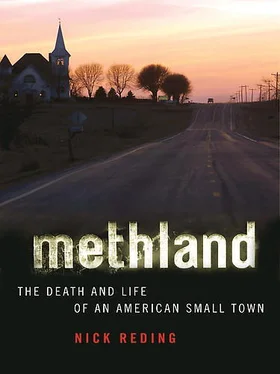If Oelwein could just kick-start itself, said Murphy—if it could just get some decent business into the IP—there’d be time to consider more sides of the equation. Maybe Murphy, given his extensive connections in state government, could create some momentum for Nathan Lein’s idea that meth addicts serve five-year probationary periods, during which they have to hold jobs and attend mandatory meetings with a counselor. Maybe, once there was more revenue in town, they could bring in an actual treatment facility, as Clay Hall-berg had begged him to do. Some real treatment alternatives might help Oelwein nip drug abuse in the bud, rather than simply treating its symptoms—even as those symptoms gained ineluctable momentum.
For now, though, that was all a pipe dream. There was no excess revenue for anything, never mind treatment. Murphy’s task was to raise the town from the ashes. He had to build a foundation of decent economic growth, and he had to do it ASAP. Businesses like the call center could afford to be choosy—every hard-luck town in the United States was courting them. In fact, Murphy believed that most companies were looking for a certain modicum of poverty as a fail-safe against union organizing. If people were desperate, they’d concede this essential ground to the company. Murphy understood the game. As he once put it to me in an e-mail, he was “enough of a student of economic trends in the last two decades to understand [he had to] play on the edges for wage and benefit rates.” The trick was to look like something in between a union town and a town that was downright criminally dangerous. Oelwein had to appear complacently impoverished but nonetheless like a nice place to raise a family.
That meant that social order needed to take precedence, even if it involved taking a few un-civil liberties, and Murphy’s sympathy regarding meth addicts was trumped by a certain mercilessness. No business was going to invest in a town with a bunch of tweakers riding around cooking dope on their bicycles, blowing up their own homes, and shaking inside their overcoats as they picked through the Dumpster behind the gas station. The trick, if Murphy could succeed in getting a handle on Oelwein’s meth problem, would be to lure businesses that wouldn’t automatically reinvigorate the meth industry by offering substandard jobs. Oelwein needed work, but it didn’t need the kind of work that had inundated Greenville, Illinois: half-time jobs with no benefits at Wal-Mart or Super 8, which injected little revenue into the local economy. Oelwein didn’t need any more meatpacking plants, either, which offered high worker-injury rates and minimal compensation. Bad jobs, Murphy knew, had gotten Oelwein in trouble in the first place. Being treated poorly by employers, he said, had sucked the hope out of people’s lives. It made meth seem like the only alternative. Nowadays, bad jobs came with the added burden of immigrant workers who couldn’t afford their hospital bills and whose children had to be taught English by the already overextended schools. And yet towns across the nation were clamoring for what ever jobs they could get. It was an almost impossible situation in which Murphy found himself. Compared with this, his past battles as a liberal pro-lifer had been a cakewalk.
During 2004 and 2005, Murphy had done everything possible to run the small-lab meth business out of town as a means of preparing Oelwein to rebuild. This was not just to compete with the towns in India or Nebraska that might lure the likes of the call center. It was to compete with Oelwein’s more immediate neighbors. Nathan had told me, along with several other people, that DHS workers in nearby Buchanan County—home of pretty, prosperous little Independence—had for years been recommending that their worst cases move to Fayette County, and particularly to Oelwein, where taxes were low and the rental market was burgeoning. A kind of economic cannibalism had set in following the farm crisis, the ravages of population loss, and the onset of the meth epidemic. Towns, unsure of their own futures, hedged their bets, often to the detriment of their neighbors. According to a local real estate broker, In dependence had effectively made Oelwein its ghetto. “Low rent,” the broker went on, was synonymous with “meth lab.” It’s in this way that ridding Oelwein of its small labs became a kind of shoving match between two city-states, with the de facto goal of running the people from Buchanan County out of Fayette.
To this end, Murphy had given wide authority to police chief Jeremy Logan. Logan in turn had instilled a culture of aggressiveness in his men. He’d built a new canine unit around a twelve-thousand-dollar drug-sniffing German shepherd. And he’d put himself in charge of enforcing new ordinances, passed by the city council, ordering the cleanup or destruction of run-down properties—just the kind of grimy, falling-apart rentals, said the real estate agent, that the castoffs from Buchanan County favored.
Every morning, Jeremy Logan leaves his house and drives five blocks to work in a blue Ford Expedition emblazoned with the words Oelwein Police in the town’s green and yellow colors. Logan is of middle height and weight. His short brown hair is in a crew cut, which, along with the sharp features of his face and the acne scars along his cheeks and jawbones, gives him a decidedly military air. It takes only minutes, though, for Logan to reveal a deeply ingrained streak of friendly sarcasm and a sharp appreciation for the irony that surrounds him. According to Clay Hallberg, for decades, if not since the police department’s founding, the men saddled with protecting the citizens of Oelwein have been a violent bunch, and disdainful of the rights of the citizens in this notoriously tough railroad town. (When asked to confirm this, Nathan Lein smiled and said, “I wouldn’t want to be arrested, put it that way.”) Of the ten-man force, Logan is the only one with a college degree. Many of his officers are built more like offensive linemen; almost all of them shave their heads. Knowing this and taking into account once again Logan’s physical characteristics—the army crew; the soft middle signaling a distaste for the gym—is to understand that Logan is a reflection of his job, which exists in the delicate middle ground between the brute strength of the department and the slick, erudite bonhomie of Larry Murphy. Sarcasm, says Logan, is more than a coping mechanism. It’s like a second language.
Being the chief of police is perhaps the only job in town more visible than being mayor. Murphy, when he’s not running Oelwein, has a political consulting business that sends him regularly to Des Moines, a three-hour drive south. Murphy’s kids are grown, and he works from home, meaning that he can choose to hole up for a couple of days should things get tough—as they did when he lobbied to make riding a bike on Main Street illegal. Logan cannot. He is constantly on display, whether picking up his three young children from school or heading to the scene of an accident in his truck. When he does things that people don’t like—agreeing to arrest students at Oelwein High, for instance—it’s not just he who hears about it. It’s his wife, too, who has to smile and nod while she waits for her latte at the Morning Perk. Still, says Logan, this is a walk in the park compared with the year before Murphy made him chief of police. That year nearly drove Logan out of the town where he’d lived his whole life.
Details vary, but the consensus around town is that the former police chief, under whom Logan had achieved the rank of sergeant, ran a loose ship. All Logan will say on the record is that there was a certain “laxness around the department,” and that he thought it appropriate to one day approach the chief and tell him how unhappy he was with the situation. The chief, according to Logan, thanked him for his input and said he’d think about what to do. Two days later, according to Logan, his wife called him at work to say he was being accused of peeping in the bedroom of a local teenage girl. Further, said Logan’s wife, the rumor around town was that the chief was suspending Logan indefinitely without pay. Criminal charges were expected shortly, followed by the high likelihood of a civil suit. This was the first Logan, who was on duty when his wife called, had heard of the charges.
Читать дальше












